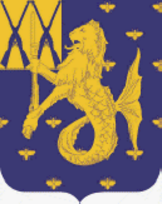43rd Infantry Regiment, US Army: Difference between revisions
Knorrepoes (talk | contribs) m (Text replacement - " ↵↵''' {{uc:{{PAGENAME}}}} '''" to "''' {{uc:{{PAGENAME}}}} '''") |
Knorrepoes (talk | contribs) m (Text replacement - "|Arms of {{PAGENAME}}]]" to "|Coat of arms (crest) of {{PAGENAME}}]]") Tags: Mobile edit Mobile web edit |
||
| Line 3: | Line 3: | ||
{|align="center" | {|align="center" | ||
|align="center"|[[File:{{PAGENAME}}.png|center|350 px| | |align="center"|[[File:{{PAGENAME}}.png|center|350 px|Coat of arms (crest) of {{PAGENAME}}]] <br> (Coat of Arms) | ||
|align="center"|[[File:{{PAGENAME}}dui.png|center|350 px| | |align="center"|[[File:{{PAGENAME}}dui.png|center|350 px|Coat of arms (crest) of {{PAGENAME}}]]<br> (Distinctive Unit Insignia) | ||
|} | |} | ||
Revision as of 11:54, 20 August 2023
43RD INFANTRY REGIMENT, US ARMY
| (Coat of Arms) |
(Distinctive Unit Insignia) |
Official blazon
Shield: Azure, semé of bees volant Or, a sea lion of the second grasping in dexter claw a musket with bayonnet, on a canton of the second four muskets two and two saltirewise conjoined forming the Roman notation "XX" of the first.
Origin/meaning
The regiment was organized in 1917 at Fort Douglas, Utah, by transfer of men from the 20th Infantry. Its station is the Philippines. The seal of Utah is a beehive with flying bees and the arms of the Philippines display the sea lion. The Infantry is indicated by the color of the shield and musket in the lion's paw. The parent regiment is indicated by the canton.
The arms were approved on 6 January 1922.
Literature: Image from Wikimedia Commons
. Information from The Institute of Heraldry, US Army.
